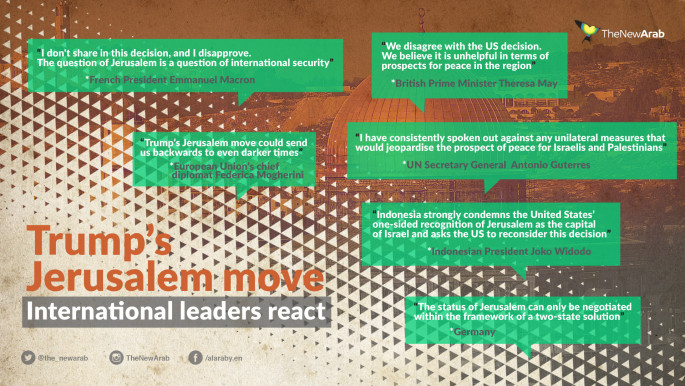US Vice-President Mike Pence tells Israel parliament Jerusalem embassy will open 'next year'
The US embassy in Israel will be shifted to Jerusalem next year, Vice-President Mike Pence vowed Monday, as the envoy made a speech to Knesset strongly supporting Israel's claims to the disputed city.
Pence opened his visit to Israel by meeting right-wing Prime Minister Binyamin Netanyahu in Jerusalem, saying he was "honoured" to be in "Israel's capital" - further acknowledging Tel Aviv's claims to the divided city.
Later he announced to the Israel's parliament that the US would speed up the opening of its embassy in Jerusalem, in a speech that sparked an angry backlash from Palestinian members of the Knesset.
"Jerusalem is Israel's capital, and as such President Trump has directed the State Department to immediately begin preparations to move the United States embassy from Tel Aviv to Jerusalem," Pence said to prolonged applause from Israeli parliamentarians.
"In the weeks ahead our administration will advance its plan to open the United States embassy in Jerusalem. And that United States embassy will open before the end of next year."
Embassy move
It follows President Donald Trump's 6 December announcement that the US would recognise Jerusalem as Israel's capital, sparking anger from Palestinians and Arab friends of Washington.
The move also led to outcry from the international community who almost unaminiously view Israel's occupation of Palestinian east Jerusalem as illegal.
Pence's original date of December for his Middle East tour was pushed back to January, after Arab allies voiced opposition to the embassy move, while protests and unrest led to the deaths of 17 Palestinians.
The US vice-president's visit has been boycotted by Palestinian officials, while Jordan King Abdullah al-Hussein voiced his opposition to the move during a meeting with Pence.
Religious figures - both Christian and Muslim - had announced they would boycott Pence during his tour of the region, which included visits to Egypt and Jordan.
Pence's speech will likely sharpen the divide between Palestinian Authority President Mahmoud Abbas and Israel's right-wing administration.
Abbas broke off relations with the US over the embassy move, saying that any peace deal would require Israel's recognition of east Jerusalem as the capital of a future Palestinian state.
Pence called on diplomatic relations to be restored and for Abbas to hold negotiations with Israel again.
"Today we strongly urge the Palestinian leadership to return to the table," he said. "Peace can only come through dialogue."
Peace?
Palestinians are highly sceptical of Trump administration's role in peace talks about believe the US will press Ramallah heavily to accept a settlement that benefits Israel.
Abbas used the opportunity of Pence's speech in Israel to call on the EU to recognise Palestine.
"We truly consider the European Union as a true partner and friend, and therefore we call its member states to swiftly recognise the state of Palestine and we confirm that there is no contradiction between recognition and the resumption of negotiations," he said.
Pence further attacked Israel's regional nemesis Iran, saying the US would never allow Tehran to build a nuclear weapon.
"I have a solemn promise to Israel, to all the Middle East and to the world - the United States of America will never allow Iran to acquire a nuclear weapon," he said.
Israel believes Iran's civilian nuclear programme is being used as cover to build an A-bomb, while Trump has repeatedly threatened to tear up an agreement between Tehran and Washington on the issue.
Pence's original date of December for his Middle East was pushed back to January, after Arab allies voiced opposition to the embassy move while protests and unrest led to the deaths of 17 Palestinians.
The US vice-president's tour was boycotted by Palestinian officials, while Jordan King Abdullah bin al-Hussein voiced strong opposition to the move during a meeting with Pence.
 |
Jerusalem is Israel's capital, and as such President Trump has directed the State Department to immediately begin preparations to move the United States embassy from Tel Aviv to Jerusalem. - US Vice-President Mike Pence |
 |
Religious figures - both Christian and Muslim - also refused to meet Pence during his tour of the region, which included visits to Egypt and Jordan.
His speech will likely sharpen the divide between Israel and Palestinian Authority President Mahmoud Abbas, who used Pence's visit as an opportunity to call on the EU to recognise Palestine.
"We truly consider the European Union as a true partner and friend, and therefore we call its member states to swiftly recognise the state of Palestine and we confirm that there is no contradiction between recognition and the resumption of negotiations," he said.
Pence further attacked Israel's regional nemesis Iran, saying the US would never allow Tehran to build a nuclear weapon.






 Follow the Middle East's top stories in English at The New Arab on Google News
Follow the Middle East's top stories in English at The New Arab on Google News
![Israeli forces ordered bombed Gaza's Jabalia, ordering residents to leave [Getty]](/sites/default/files/styles/image_330x185/public/2176418030.jpeg?h=a5f2f23a&itok=_YGZaP1z)

